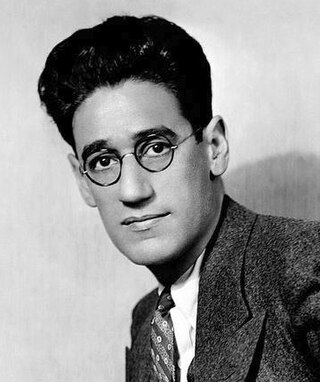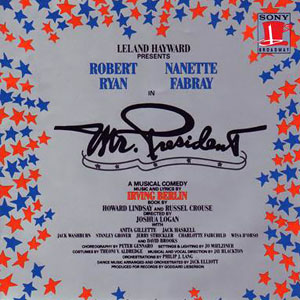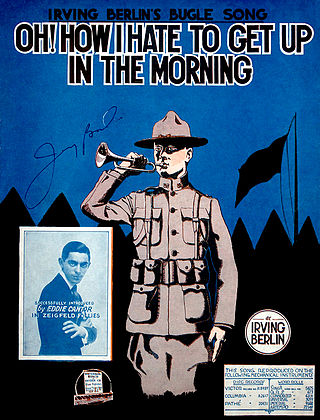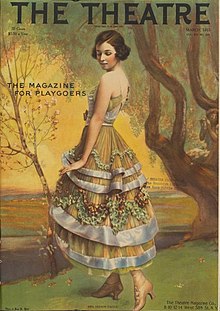
George Simon Kaufman was an American playwright, theater director and producer, humorist, and drama critic. In addition to comedies and political satire, he wrote several musicals for the Marx Brothers and others. He won the Pulitzer Prize for Drama for the musical Of Thee I Sing in 1932, and won again in 1937 for the play You Can't Take It with You. He also won the Tony Award for Best Director in 1951 for the musical Guys and Dolls.

Musical theatre is a form of theatrical performance that combines songs, spoken dialogue, acting and dance. The story and emotional content of a musical – humor, pathos, love, anger – are communicated through words, music, movement and technical aspects of the entertainment as an integrated whole. Although musical theatre overlaps with other theatrical forms like opera and dance, it may be distinguished by the equal importance given to the music as compared with the dialogue, movement and other elements. Since the early 20th century, musical theatre stage works have generally been called, simply, musicals.

Irving Berlin was an American composer and lyricist. His music forms a large part of the Great American Songbook. Berlin received numerous honors including an Academy Award, a Grammy Award, and a Tony Award. He also received the Presidential Medal of Freedom from President Gerald R. Ford in 1977. Broadcast journalist Walter Cronkite stated he "helped write the story of this country, capturing the best of who we are and the dreams that shape our lives".

Otto Abels Harbach, born Otto Abels Hauerbach was an American lyricist and librettist of nearly 50 musical comedies and operettas. Harbach collaborated as lyricist or librettist with many of the leading Broadway composers of the early 20th century, including Jerome Kern, Louis Hirsch, Herbert Stothart, Vincent Youmans, George Gershwin, and Sigmund Romberg. Harbach believed that music, lyrics, and story should be closely connected, and, as Oscar Hammerstein II's mentor, he encouraged Hammerstein to write musicals in this manner. Harbach is considered one of the first great Broadway lyricists, and he helped raise the status of the lyricist in an age more concerned with music, spectacle, and stars. Some of his more famous lyrics are "Smoke Gets in Your Eyes", "Indian Love Call" and "Cuddle up a Little Closer, Lovey Mine".
This is a list of notable events in music that took place in the year 1914.
This is a list of notable events in music that took place in the year 1912.
This is a list of notable events in music that took place in the year 1911.
This is a list of notable events in music that took place in the year 1910.

Annie Get Your Gun is a musical with lyrics and music by Irving Berlin and a book by Dorothy Fields and her brother Herbert Fields. The story is a fictionalized version of the life of Annie Oakley (1860–1926), a sharpshooter who starred in Buffalo Bill's Wild West, and her romance with sharpshooter Frank E. Butler (1847–1926).

Robert Russell Bennett was an American composer and arranger, best known for his orchestration of many well-known Broadway and Hollywood musicals by other composers such as Irving Berlin, George Gershwin, Jerome Kern, Cole Porter, and Richard Rodgers.

Harry Bache Smith was a writer, lyricist and composer. The most prolific of all American stage writers, he is said to have written over 300 librettos and more than 6000 lyrics. Some of his best-known works were librettos for the composers Victor Herbert and Reginald De Koven. He also wrote the book or lyrics for several versions of the Ziegfeld Follies.
Harry Akst was an American songwriter, who started out his career as a pianist in vaudeville accompanying singers such as Nora Bayes, Frank Fay and Al Jolson.
Henry Martyn Blossom Jr. was an American writer, playwright, novelist, opera librettist, and lyricist. He first gained wide attention for his second novel, Checkers: A Hard Luck Story (1896), which was successfully adapted by Blossom into a 1903 Broadway play, Checkers. It was Blossom's first stage work and his first critical success in the theatre. The play in turn was adapted by others creatives into two silent films, one in 1913 and the other in 1919, and the play was the basis for the 1920 Broadway musical Honey Girl. Checkers was soon followed by Blossom's first critical success as a lyricist, the comic opera The Yankee Consul (1903), on which he collaborated with fellow Saint Louis resident and composer Alfred G. Robyn. This work was also adapted into a silent film in 1921. He later collaborated with Robyn again; writing the book and lyrics for their 1912 musical All for the Ladies.

Mr. President is a musical with a book by Howard Lindsay and Russel Crouse and music and lyrics by Irving Berlin. The story focuses on fictional US President Stephen Decatur Henderson, who runs into political trouble following a disastrous trip to the Soviet Union, and his problems with his children. Bored with life as a civilian after his presidency ends, he decides to return to political life.

As Thousands Cheer is a revue with a book by Moss Hart and music and lyrics by Irving Berlin, first performed in 1933. The revue contained satirical sketches and witty or poignant musical numbers, several of which became standards, including "Heat Wave", "Easter Parade" and "Harlem on my Mind". The sketches were loosely based on the news and the lives and affairs of the rich and famous, as well as other prominent personalities of the day, such as Joan Crawford, John D. Rockefeller Jr., Noël Coward, Josephine Baker, and Aimee Semple McPherson.
"Easter Parade" is a popular song, written by Irving Berlin and published in 1933. Berlin originally wrote the melody in 1917, under the title "Smile and Show Your Dimple", as a "cheer up" song for a girl whose man has gone off to fight in World War I. A recording of "Smile and Show Your Dimple" by Sam Ash enjoyed modest success in 1918.
John Alexander McGlinn III was an American conductor and musical theatre archivist. He was a leading advocate of the use of original orchestrations and vocal arrangements in studio cast recordings of Broadway musicals, and he made several notable albums exemplifying his philosophy of historical authenticity.

"Oh! How I Hate to Get Up in the Morning" is a song written by Irving Berlin in 1918 that gives a comic perspective on military life. Berlin composed the song as an expression of protest against the indignities of Army routine shortly after being drafted into the United States Army in 1918. The song soon made the rounds of camp and became popular with other soldiers, partly because hatred of reveille was universal.
![<i>Stop! Look! Listen!</i> 1915 [[musical theatre|musical]] with music and lyrics by Irving Berlin and book by Harry B. Smith](https://upload.wikimedia.org/wikipedia/en/9/9d/I_Love_A_Piano_Sheet_Music.jpg)
Stop! Look! Listen! is a musical in three acts with music and lyrics by Irving Berlin and book by Harry B. Smith. The piece had additional music by Henry Kailimai and Jack Alau and additional lyrics by G. H. Stover and Sylvester Kalama.











![<i>Stop! Look! Listen!</i> 1915 [[musical theatre|musical]] with music and lyrics by Irving Berlin and book by Harry B. Smith](https://upload.wikimedia.org/wikipedia/en/9/9d/I_Love_A_Piano_Sheet_Music.jpg)